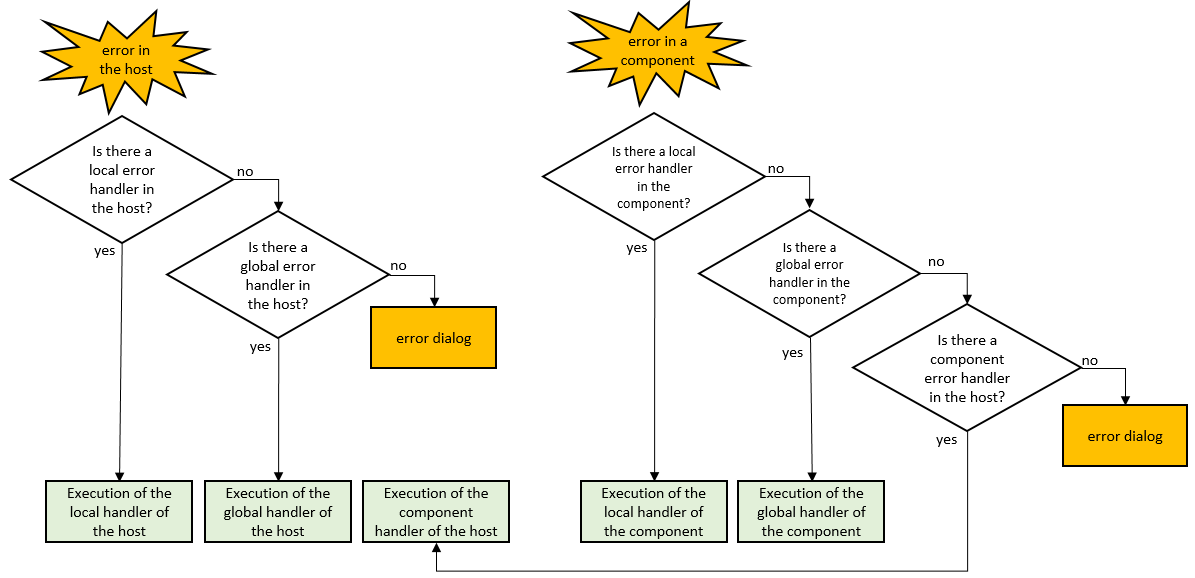エラー処理
エラー処理とは、アプリケーション内で発生する可能性のあるエラーに備え、対処することです。 ランタイムにおけるエラーのキャッチや報告、またそれらの条件を検証するため、4Dは包括的なサポートを提供しています。
エラー処理は次の2つの要望に応えます:
- 開発フェーズにおいて、問題となりうるコードのエラーやバグを発見して修正したい。
- 運用フェーズにおいて、予期しないエラーを検知して回復したい。とくに、システムエラーダイアログ (ディスクが一杯、ファイルがない、など) を独自のインターフェースに置換できます。
基本的に、4D でエラー処理する方法は 2つあります。 次のことが可能です: 次のことが可能です:
- エラー処理メソッドを実装する
- エラーを投げる可能性のある関数・メソッド・式を呼び出すコードの前に
Try()keyword またはTry/Catchstructure 文を使う
サーバー上で実行されるコードのため、4D Server にはグローバルなエラー処理メソッドを実装しておくことが強く推奨されます。 4D Server が ヘッドレス で実行されていない場合 (つまり、管理画面 付きで起動されている場合)、このメソッドによって、予期せぬダイアログがサーバーマシン上に表示されることを防ぎます。 ヘッドレスモードでは、エラーは解析のため 4DDebugLog ファイル に記録されます。
予測可能なエラーvs予測不可能なエラー
entity.save() や transporter.send() などの多くの4D クラス関数は、status 情報を格納しているオブジェクトを返します。 このオブジェクトには、プログラムの実行を停止する必要のないエラー(無効なパスワード、ロックされたエンティティ)など、ランタイムコンテキストにおける予測可能なエラーを保存するのに使用されます。 このカテゴリのエラーは、サイレントエラーとも呼ばれ、通常のコードで管理することができます。 Try、Try/Catch あるいはエラー処理メソッド などのエラー処理コンテキストにおいてこのようなエラーが発生した場合、これらは実行を中断することはせず、エラー処理(例: Try/Catch のCatch 部分)をトリガーすることはありません。 これらはLast errors のコレクションには含まれません。 エラーは返されるオブジェクトのstatus および statusText プロパティ内にのみ返されます。 これはビジネスロジックに応じて処理することが可能です。
もう一つのエラーのカテゴリーは予測不可能なエラーと呼ばれ、別名深刻なエラーとも呼ばれます。 これにはディスク書き込みエラー、ネットワーク失敗、あるいはそれ以外の予期せぬ中断が含まれます。 これらのカテゴリーのエラーはコード、メッセージおよび署名によって定義される例外を生成します。 これらは実行を中断し、Try、Try/Catch あるいは エラー処理メソッド 機能のエラー処理をトリガーします。 これらはLast errors のコレクションに含まれます。 深刻なエラーは、プロパティに値(例: dk status serious error - "その他のエラー")も返すことがあり得るという点に注意してください。
エラー処理メソッドの実装
4D においては、エラー専用のプロジェクトメソッドである エラー処理 (または エラーキャッチ) メソッド内ですべてのエラーをキャッチし、処理することができます。
インストールされたエラーハンドラーは、4Dアプリケーションまたはそのコンポーネントでエラーが発生した場合、インタープリターモードまたはコンパイル済モードで自動的に呼び出されます。 実行コンテキストに応じて、異なるエラーハンドラーを呼び出すこともできます (後述参照)。
エラー処理用のプロジェクトメソッドを 実装 するには、ON ERR CALL コマンドをコールし、当該プロジェクトメソッド名と (任意で) スコープを引数として渡します。 例:
ON ERR CALL("IO_Errors";ek local) // ローカルなエラー処理メソッドを実装します
実行コンテキストにおいてエラーの検知を中止するには、空の文字列を指定して再度 ON ERR CALL コマンドをコールします:
ON ERR CALL("";ek local) // ローカルプロセスにおいてエラーの検知を中止します
Method called on error コマンドを使用すると、カレントプロセスにおいてON ERR CALL で実装されたメソッドの名前を知ることができます。 このコマンドは汎用的なコードでとくに有用です。エラー処理メソッドを一時的に変更し、後で復元することができます:
$methCurrent:=Method called on error(ek local)
ON ERR CALL("NewMethod";ek local)
// ドキュメントが開けない場合にエラーが生成されます
$ref:=Open document("MyDocument")
// 前のエラー処理メソッドに戻します
ON ERR CALL($methCurrent;ek local)
スコープとコンポーネント
エラー処理メソッドは、実行コンテキストごとに設定することができます:
- カレントプロセス - ローカルなエラーハンドラーはカレントプロジェクトのカレントプロセスで発生したエラーに対してのみ呼び出されます。
- アプリケーション全体 - グローバルなエラーハンドラーは、カレントプロジェクトのアプリケーションの実行コンテキストで発生したすべてのエラーに対して呼び出されます。
- コンポーネント - このエラーハンドラーはホストプロジェクトにおいて定義され、コンポーネント内で発生したすべてのエラーに対して、(コンポーネント内のハンドラーで処理されない場合に) ホスト内で呼び出されます。
例:
ON ERR CALL("IO_Errors";ek local) // ローカルなエラー処理メソッドをインストールします
ON ERR CALL("globalHandler";ek global) // グローバルなエラー処理メソッドをインストールします
ON ERR CALL("componentHandler";ek errors from components) // コンポーネント用のエラー処理メソッドをインストールします
"フォールバック" として機能するグローバルエラーハンドラーと、特定プロセス専用のローカルエラーハンドラーを同時にインストールすることができます。 グローバルなエラーハンドラーは、インターフェース付きでサーバーを実行している場合にエラーダイアログの表示を避けるためにも有効です。
アプリケーションにおいて一つのエラーキャッチメソッドを使うやり方もあれば、アプリケーションのモジュールごとに違うメソッドを定義する方法もあります。 ただし、一つのプロジェクトと一つの実行コンテキストにつき実装できるのは一つのメソッドのみです。
エラーが発生した場合、以下の図のように 1つのメソッドのみが呼び出されます:

メソッド内でのエラー処理
独自に作成したエラー処理メソッド内では、エラーを調査するための情報がいくつか提供されています:
-
専用のシステム変数:
Error(倍長整数): エラーコードError method(テキスト): エラーを生成したメソッドの名称Error line(倍長整数): エラーを生成したメソッドの行番号Error formula(テキスト): エラーの元となった 4D コードのフォーミュラ (テキスト)
4D は、いくつかの システム変数 と呼ばれる専用の変数を自動的に管理しています。
Last errorsコマンドは、4Dアプリケーションで発生したカレントエラースタックに関する情報をコレクションとして返します。Call chainコマンドは、カレントプロセス内におけるメソッド呼び出しチェーンの各ステップを説明するオブジェクトのコレクションを返します。
例題
簡単なエラー処理システムの例です:
// エラー処理メソッドをインストールします
ON ERR CALL("errorMethod")
//... コードの実行
ON ERR CALL("") // エラーの検知を中止します
// errorMethod プロジェクトメソッド
If(Error#1006) // これはユーザーによる割り込みではありません
ALERT("エラー "+String(Error)+" が発生しました。問題となったコードはこちらです: \""+Error formula+"\"")
End if
空のエラー処理メソッド
標準のエラーダイアログを表示させないようにするには、空のエラー処理メソッドを実装するだけで実現できます。 Error システム変数はエラー処理メソッド以外のメソッドでも確認することができます:
ON ERR CALL("emptyMethod") // emptyMethod は空のエラー処理メソッドです
$doc:=Open document( "myFile.txt")
If (Error=-43)
ALERT("ファイルが見つかりません。")
End if
ON ERR CALL("")
Try(expression)
Try(expression) 文は、実際の実行コンテキスト (特にローカル変数の値を含む) で単一行の式をテストし、スローされるエラーをキャッチすることで、4D のエラーダイアログボックスが表示されないようにできます。 Try(expression) を使用すると、非常に少ないコードで単純なエラーケースを処理することができ、エラー処理メソッドを必要としません。
単一行の式におさまらない、より複雑なコードをtry したい場合には、Try/Catch 構造の使用を検討してみてください 。
Try(expression) 文の正式なシンタックスは、以下の通りです:
Try (expression) : any | Undefined
expression には任意の有効な式を使用できます。
実行中にエラーが発生した場合、Try() の呼び出し前に エラー処理メソッド がインストールされたかどうかに関係なく、エラーダイアログは表示されず、エラーはキャッチされます。 expression が値を返す場合、Try() は最後に評価された値を返します。値が返されない場合、Try() は Undefined を返します。
Last errors コマンドを使用してエラーを処理することができます。 expression が Try() のスタック内でエラーをスローした場合、実行フローは停止し、最後に実行された Try() (コールスタック内で最初に見つかったもの) に戻ります。
もし expression によって エラー処理メソッド がインストールされた場合、エラー発生時にはそれが呼び出されます。
例題
- ファイルをエラーなく開くことができ、その内容が読み取り可能な場合に、ファイルの内容を表示します。 以下のように書くことができます: 以下のように書くことができます:
var $text : Text
var $file : 4D.File := File("/RESOURCES/myFile.txt")
var $fileHandle : 4D.FileHandle := Try($file.open())
If ($fileHandle # Null)
$text:=Try($fileHandle.readText()) || "ファイル読み込みエラー"
End if
- ゼロ除算エラーを処理します。 ゼロ除算エラーを処理します。 ここでは 0 を返し、エラーをスローするようにします:
function divide( $p1: real; $p2: real)-> $result: real
if ($p2=0)
$result:=0 // 可読性のため (実数のデフォルトは 0 です)
throw(-12345; "ゼロ除算")
else
$result:=$p1/$p2
end if
function test()
$result:=Try(divide($p1;$p2))
If (Last errors # null)
ALERT("エラー")
End if
- [予測可能なエラーと予測不可能なエラー]{#predictable-vs-unpredictable-errors} の両方を管理したい場合を考えます:
var $e:=ds.Employee.new()
$e.name:="Smith"
$status:=Try($e.save()) // 予測可能なエラーと予測不可能なエラーをキャッチします
If ($status.success)
ALERT( "成功")
Else
ALERT( "エラー: "+JSON Stringify($status.errors))
End if
Try...Catch...End try
Try...Catch...End try 文は、実際の実行コンテキスト (特にローカル変数の値を含む) でコードブロックをテストし、スローされるエラーをキャッチすることで、4D のエラーダイアログボックスが表示されないようにできます。
Try(expression) キーワードが単一の行の式を評価するのとは異なり、Try...Catch...End try 文は、単純なものから複雑なものまで、任意のコードブロックを評価することができます。エラー処理メソッドは必要としない点は同じです。 また、Catch ブロックは、任意の方法でエラーを処理するために使用できます。
Try...Catch...End try 構文の正式なシンタックスは、以下の通りです:
Try
statement(s) // 評価するコード
Catch
statement(s) // エラーの場合に実行するコード
End try
Try と Catch キーワード間のコードが最初に実行されます。その後のフローは、実行に発生したエラーによって異なります。
- エラーがスローされなかった場合には、対応する
End tryキーワードの後へとコード実行が継続されます。CatchとEnd tryキーワード間のコードは実行されません。 - コードブロックの実行が 非遅延エラー をスローした場合、実行フローは停止し、対応する
Catchコードブロックを実行します。 - コードブロックが 非遅延エラー をスローするメソッドを呼び出した場合、実行フローは対応する
Catchコードブロックへと直接ジャンプします。 - 遅延エラーが
Tryブロックから直接スローされた場合、実行フローはTryブロックの終わりまで継続し、対応するCatchブロックは実行しません。
遅延 エラーが Try ブロック外で投げられた場合、メソッドまたは関数の終わりまでコードが実行されます。
遅延 エラーと non-deferred エラーの詳細については、throw コマンドの説明を参照してください。
Catch コードブロックでは、標準のエラー処理コマンドを使用してエラーを処理できます。 Last errors 関数は最後のエラーに関するコレクションを格納しています。 このコードブロック内でエラー処理メソッドを宣言する こともできます。この場合エラー発生時にはそれが呼び出されます(宣言しない場合には、4Dエラーダイアログが表示されます)。
Try および Catch キーワードの間のコードでエラー処理メソッド がインストールされている場合には、エラー発生時にはそれが呼ばれます。
例題
トランザクションと Try...Catch...End try 文を組み合わせることで、重要な機能のためにセキュアなコードを書くことができます。
Function createInvoice($customer : cs.customerEntity; $items : Collection; $invoiceRef : Text) : cs.invoiceEntity
var $newInvoice : cs.invoiceEntity
var $newInvoiceLine : cs.invoiceLineEntity
var $item : Object
ds.startTransaction()
Try
$newInvoice:=This.new()
$newInvoice.customer:=$customer
$newInvoice.invoiceRef:=$invoiceRef
For each ($item; $items)
$newInvoiceLine:=ds.invoiceLine.new()
$newInvoiceLine.item:=$item.item
$newInvoiceLine.amount:=$item.amount
$newInvoiceLine.invoice:=$newInvoice
// インボイス項目を検証するその他の関数を呼び出します
$newInvoiceLine.save()
End for each
$newInvoice.save()
ds.validateTransaction()
Catch
ds.cancelTransaction()
ds.logErrors(Last errors)
$newInvoice:=Null
End try
return $newInvoice
エラーコード
コード実行を妨げる例外は4D によって返されますが、その原因はOS、デバイス、4D カーネル、コード内のthrow など、様々な要因が考えられます。 そのため、3つの要素によって定義されます:
- コンポーネント署名。エラーの起きた場所を表します(署名の一覧については
Last errorsを参照してください) - メッセージ。エラーがなぜ起きたかを説明します。
- コード。コンポーネントによって返される任意の数値です。
4D エラーダイアログボックス はユーザーに対してコードとメッセージを表示します。
エラーと特にその原因の完全な詳細を取得するには、Last errors コマンドを呼び出す必要があります。 最終アプリケーションにおいてエラー処理メソッド を使用してエラーへの割り込みと処理ををする場合、Last errors を使用して必ずerror オブジェクトの全てのプロパティを記録するようにしてください。エラーコードはコンポーネントによって異なるからです。